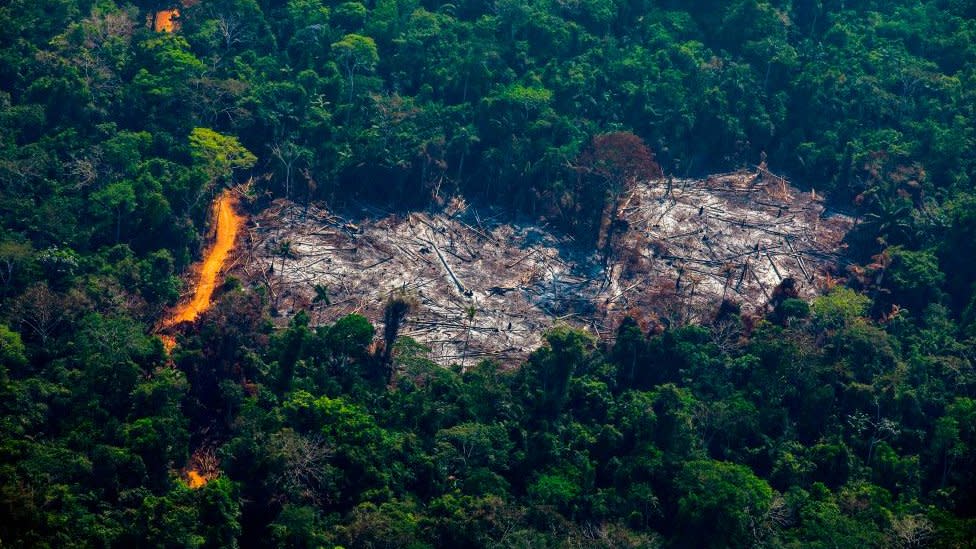
A historical review called for a transformational change in our economic approach to nature.
The long-awaited analysis by Professor Sir Partha Dasgupta of the University of Cambridge says that prosperity has a “devastating” cost to the natural world.
The report proposes to recognize nature as an asset and reconsider our measures of economic prosperity.
It is expected to set the government policy agenda in the future.
At its heart is the idea that sustainable economic growth requires a different measure than Gross Domestic Product (GDP).
“Truly sustainable economic growth and development means recognizing that our long-term prosperity depends on rebalancing our demand for nature’s goods and services with their ability to supply them,” said Professor Dasgupta in a statement.
“It also means taking full account of the impact of our interactions with nature at all levels of society.”
Covid-19 showed us what can happen when we don’t do that, he added. “Nature is our home. A good economy requires us to manage it better.”

The Dasgupta Review on the Economics of Biodiversity was commissioned by the UK Treasury in 2019, the first time that a national finance ministry has authorized a full assessment of nature’s economic importance.
The report, which was compared to the influential 2006 Stern Review on the Economics of Climate Change, sets out the ways in which we should take into account nature in the economy and in decision-making.
Recommendations include:
-
Making food and energy systems sustainable through technological and policy innovations that change prices and behavioral standards
-
Invest in programs that provide community-based family planning
-
Expand and improve access to protected areas
-
Implementing large-scale and widespread investments in nature-based solutions to address biodiversity loss
-
Introduction of natural capital in national accounting systems.

Prime Minister Boris Johnson welcomed the review. The United Kingdom is co-host to COP26 – this year’s UN climate meeting – and also holds the presidency of this year’s G7. Mr. Johnson said, “We will ensure that the natural world remains at the top of the global agenda.”
Sir David Attenborough, who wrote the preface to the review, said: “This comprehensive and immensely important report shows us how, by putting economics and ecology face to face, we can help save the natural world and, in doing so, save us. “
The 600-page review argues that biodiversity losses are undermining nature’s productivity, resilience and adaptability. This, in turn, is putting economies, livelihoods and well-being at risk.
Commenting on the review, Jennifer Morris, of the non-profit conservation organization The Nature Conservancy, described it as a “bugle” for world leaders.

“We must tackle the nature crisis in conjunction with the climate emergency for the sake of our economies, livelihoods and well-being – and for future generations,” she said.
The review was published at the beginning of a critical year to address climate change and extinction crises.
Policymakers are looking to the UN Biodiversity Conference, COP15, in Kunming, China, closely followed by the United Nations Summit on Climate Change (COP26) in Glasgow in late 2021.
Biodiversity is decreasing faster than at any time in human history. Since 1970, there has been an average decline of almost 70% in the populations of mammals, birds, fish, reptiles and amphibians.
One million animal and plant species – almost a quarter of the global total – are thought to be threatened with extinction.

The idea of being able to put a price on nature divides opinions, but accounting for nature’s economic value is increasingly guiding policy.
While some argue that the assumption that the natural world has no value is built into current business models, others have doubts about whether an ecosystem can be accurately represented by financial models.
Katie Kedward, an economist at the Institute for Innovation and Public Purpose at University College London (UCL), argues that there are conceptual problems in trying to capture the complexities of nature in financial terms.
She told BBC News: “There are significant uncertainties in estimating the loss of nature in monetary terms and, given the uncertainties involved, price-based tools cannot be used as a substitute for more important steps to restore nature.”
The review is the result of an 18-month independent global assessment of the biodiversity economy, led by Prof Dasgupta.
HM Treasury said it will examine the review’s findings and respond formally in due course.
Follow Helen on Twitter.
Originally published
